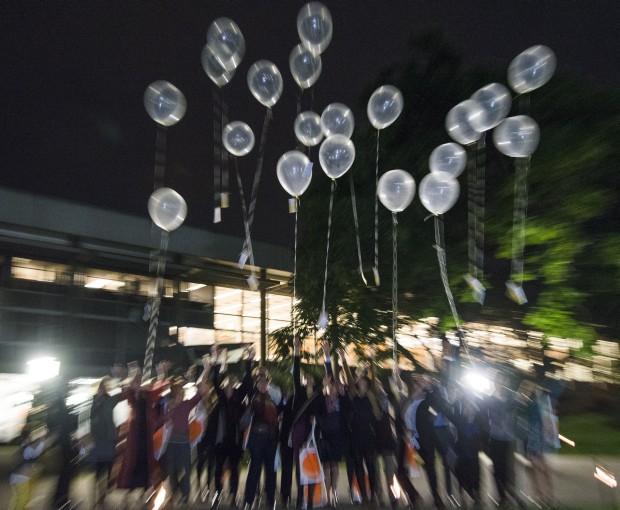
The first graduates of the German-Arab Master’s programme „Integrated Urbanism & Sustainable Design“ (IUSD) are celebrating.
Foto: team bildhübsche fotografie
Twenty-two architects, civil engineers and social scientist have made it their goal to make a change in the Middle East and North Africa with forward-looking urban planning and development. They are now qualified to do just that, having just completed their two-year joint-degree programme in Integrated Urbanism & Sustainable Design (IUSD) at the University of Stuttgart and the Ain Shams University in Cairo. They are the first to graduate from the new German-Arab Master’s programme. With their final exams behind them, the group of multi-national students realise just how much their time together has transformed them.
“What’s so great about this joint Master’s programme is that it creates a new generation that has been exposed to the modern challenges of urban and spatial planning and is now wired to respond with innovative ideas and solutions,” says Mohamed Abdel Aziz. The city planner and geo-information systems specialist from Egypt says his double degree has truly enriched his life. “Coming to terms with the different cultures and ethnic backgrounds of my fellow classmates was profound experience for me.”
The aims of the interdisciplinary IUSD programme are manifold. For one, once they are done, it expects its graduates to be in a position to set innovative and sustainable urban development processes into motion in the MENA countries. One of the central features in the programme’s first year in Stuttgart is the “Integrated Research and Design” module. The second year is marked by the “Integrated Case Study”, which features hands-on project work at the Ain Shams University in Cairo.
Planting trees is not enough
In 2012, students learned how to develop projects under the conditions “on the ground” in Cairo’s informal settlement areas. They initiated concrete measures, such as establishing a market for local products, improving a school’s grounds and constructing biogas facilities on the roofs of buildings.
“The team of students had to assess the unplanned building structures and understand the needs and perspectives of the residents and various public authorities,” reports the landscape architect and professor Antje Stokman, who directs the German-Arab programme together with the Egyptian urban planner Professor Mohamed Salheen. “The students then considered various projects for the area – some of which were also implemented.” Thanks to the partnership with the Deutsche Gesellschaft für Internationale Zusammenarbeit (GIZ), the changes successfully initiated by the students will continue to receive support and be developed further.
“The best part of this for me is that, in addition to my research, I now also know how to put my work into practice,” said the Egyptian architect Nahla Makhlouf, who teaches at Cairo University as an Assistant within the Faculty of Engineering. IUSD graduates also learned that success in urban planning requires a team with diverse and wide-ranging competencies. “Improving a school facility, for example, involves economic strategies, hands-on workshops together with members of the community, and it involves technical components as well, such as building technology and water recycling,” says Stokman. All of this needs to be brought together into a cohesive design approach. “Just drawing a few trees onto a plan is not going to get it done.”
Team spirit and diversity
Project participants hailed from Germany along with several different Arab countries, and given the cultural differences within the team, the very intense collaborative effort sometimes pushed individual participants to their personal limits. But Makhlouf speaks for many of her fellow students when emphasising the programme’s intercultural component and how this enriched the overall experience. “It helped us to develop an understanding for the ‘other’, and to believe in diversity and the fact that people can complement each other and live with differences,” she says. The result was a very unique team spirit and common culture.
The team of instructors learned lessons as well: “For this very hands-on project, we needed to find an appropriate form of teaching,” says Stokman. The goal was to integrate the latest scientific research and promote the students’ own research on current topics. “As it was, the feedback and ideas the students generated were very valuable,” she says.
The 22 Master’s theses generated by IUSD’s first graduating class are a reflection of the successful teamwork. Egypt’s Ministry of Scientific Research is now financing the first sustainable building projects. After this important experience, many IUSD programme participants want to become more autonomous in their professions. One of them is Mohamed Abdel Aziz, who is convinced that the programme supports Egypt’s young generation “to better make the decisions that are so important for Cairo’s future development.”
“This could be the start of improved urban development and planning,” says Aziz.
More about the German-Arab Master’s Programmes:
The fruits of networking: New ideas
Lively discussion lasts until midnight






